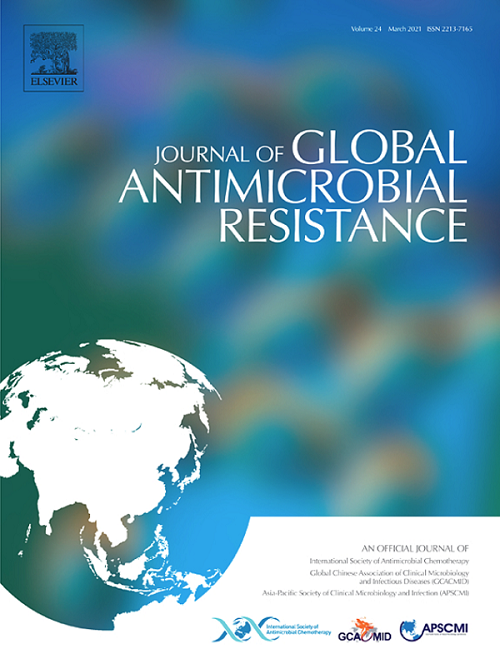Optimising personalised antibiotic treatment for methicillin-resistant Staphylococcus aureus bloodstream infections in ICU patients using a deep learning–based causal inference approach
IF 3.2
3区 医学
Q2 INFECTIOUS DISEASES
引用次数: 0
Abstract
Objective
Methicillin‑resistant Staphylococcus aureus (MRSA) bloodstream infections (BSIs) in intensive care units (ICUs) carry high mortality, and although vancomycin remains standard treatment, daptomycin and linezolid may benefit specific subgroups. This study evaluates the mortality reduction associated with vancomycin, daptomycin, and linezolid using a deep learning–based causal inference model.
Methods
Data were extracted from the Medical Information Mart for Intensive Care (MIMIC)-III and MIMIC-IV databases, including 270 ICU patients with MRSA BSI. A deep learning-based causal inference model was used to assess the treatment effect of linezolid, daptomycin, and vancomycin on in-hospital mortality. Multivariable logistic regression was employed to identify patient characteristics associated with the effectiveness of each antibiotic.
Results
The deep learning-based model predicted that vancomycin, daptomycin, and linezolid reduced mortality by 15.86% (17.90% to 13.82%), 9.68% (11.83% to 7.53%), and 10.74% (12.64% to 8.84%), respectively, with vancomycin showing the greatest reduction. The average treatment effect for in-hospital mortality reduction with vancomycin was significantly greater than that with linezolid and daptomycin (both P < 0.001). Multivariable logistic regression for treatment effects revealed that vancomycin was particularly effective in patients of advanced age, those with chronic liver disease, and those with end-stage kidney disease, while it was less effective in patients with congestive heart failure or cancer. Daptomycin exhibited superior efficacy over vancomycin in patients with cancer, and linezolid was more effective in patients with cancer, hypertension, and congestive heart failure.
Conclusion
This study highlights linezolid and daptomycin treatment in select subgroups, while a deep learning–based model enables personalised antibiotic recommendations for ICU treatment strategies.
基于深度学习的因果推理方法优化ICU患者耐甲氧西林金黄色葡萄球菌血流感染的个性化抗生素治疗。
目的:重症监护病房(icu)耐甲氧西林金黄色葡萄球菌(MRSA)血流感染(bsi)死亡率高,尽管万古霉素仍是标准治疗,但达托霉素和利奈唑胺可能对特定亚组有益。本研究使用基于深度学习的因果推理模型评估万古霉素、达托霉素和利奈唑胺相关的死亡率降低。方法:从重症监护医学信息市场(MIMIC)-III和MIMIC- iv数据库中提取数据,包括270例MRSA BSI ICU患者。采用基于深度学习的因果推理模型评估利奈唑胺、达托霉素和万古霉素对住院死亡率的治疗效果。采用多变量logistic回归来确定与每种抗生素有效性相关的患者特征。结果:基于深度学习的模型预测万古霉素、达托霉素和利奈唑胺的死亡率分别降低15.86%(17.90% ~ 13.82%)、9.68%(11.83% ~ 7.53%)和10.74%(12.64% ~ 8.84%),其中万古霉素的降低幅度最大。万古霉素在降低住院死亡率方面的平均治疗效果显著高于利奈唑胺和达托霉素(两者都是)结论:本研究突出了利奈唑胺和达托霉素在选定亚组中的治疗效果,而基于深度学习的模型可以为ICU治疗策略提供个性化的抗生素推荐。
本文章由计算机程序翻译,如有差异,请以英文原文为准。
求助全文
约1分钟内获得全文
求助全文
来源期刊

Journal of global antimicrobial resistance
INFECTIOUS DISEASES-PHARMACOLOGY & PHARMACY
CiteScore
8.70
自引率
2.20%
发文量
285
审稿时长
34 weeks
期刊介绍:
The Journal of Global Antimicrobial Resistance (JGAR) is a quarterly online journal run by an international Editorial Board that focuses on the global spread of antibiotic-resistant microbes.
JGAR is a dedicated journal for all professionals working in research, health care, the environment and animal infection control, aiming to track the resistance threat worldwide and provides a single voice devoted to antimicrobial resistance (AMR).
Featuring peer-reviewed and up to date research articles, reviews, short notes and hot topics JGAR covers the key topics related to antibacterial, antiviral, antifungal and antiparasitic resistance.
 求助内容:
求助内容: 应助结果提醒方式:
应助结果提醒方式:


